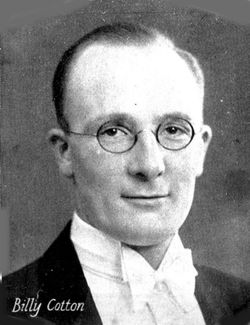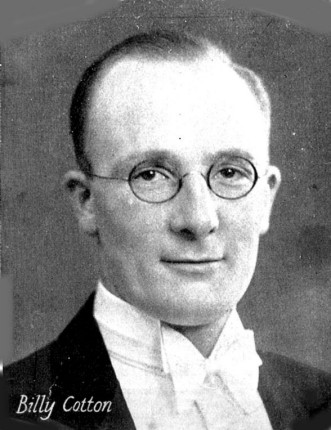Jazz Bandleader. He gained fame as a British bandleader, whose career first started in 1924 with a dance band and ran successfully for over four decades. He was not able to read music but could play the drums and bugle. Born William Edward Cotton, one of seven children, he volunteered at the dawn of World War I in August of 1914, joining the 2/2nd City of London Regiment of Royal Fusilier at age 15. He served as a drummer in Malta and Egypt, which followed to the Dardanelles and landing on West Beach on Cape Helles at Gallipoli on October 13, 1915, when he was discharged. In January of 1916, he joined the Royal Flying Corps, being Commissioned on March 9, 1918, and later with the RAF, flying a Bristol Fighter aircraft, one of which he crashed in April of 1918. In later years, he was a pilot with his own aircraft. He was decorated with the 1915 Star, Victory, and British medals. During World War II, his band entertained British troops as a member of ENSA. His radio show, the "Billy Cotton Band Show," aired from 1948 to 1968 on Sundays at noon. Airing from March of 1956 to July 1968 on Saturday evenings, he is best remembered for his television show, which had several names, including the "Billy Cotton Band Show." He was a larger-than-life Cockney character who started each show with the cry "Wakey-Wake-aaaay!," followed by the band's signature tune "Somebody Stole My Gal." He launched many singers' careers on his show. He had two sons, Ted and Sir Bill Cotton, Jr., with the latter becoming head of entertainment at the BBC. Besides being active in soccer and boxing, he had an interest in professional car racing, reaching a speed of 112.5 mph as a Grand Prix racing driver from 1938 to 1949. According to his obituary, he died from the complications of a massive stroke while attending a boxing match at Wembley Arena. His autobiography, "I Did It My Way," was posthumously published in 1970. Among his accolades, he received the Ivor Novello Award in 1959 and was voted Show Business Personality of the Year in 1962.
Jazz Bandleader. He gained fame as a British bandleader, whose career first started in 1924 with a dance band and ran successfully for over four decades. He was not able to read music but could play the drums and bugle. Born William Edward Cotton, one of seven children, he volunteered at the dawn of World War I in August of 1914, joining the 2/2nd City of London Regiment of Royal Fusilier at age 15. He served as a drummer in Malta and Egypt, which followed to the Dardanelles and landing on West Beach on Cape Helles at Gallipoli on October 13, 1915, when he was discharged. In January of 1916, he joined the Royal Flying Corps, being Commissioned on March 9, 1918, and later with the RAF, flying a Bristol Fighter aircraft, one of which he crashed in April of 1918. In later years, he was a pilot with his own aircraft. He was decorated with the 1915 Star, Victory, and British medals. During World War II, his band entertained British troops as a member of ENSA. His radio show, the "Billy Cotton Band Show," aired from 1948 to 1968 on Sundays at noon. Airing from March of 1956 to July 1968 on Saturday evenings, he is best remembered for his television show, which had several names, including the "Billy Cotton Band Show." He was a larger-than-life Cockney character who started each show with the cry "Wakey-Wake-aaaay!," followed by the band's signature tune "Somebody Stole My Gal." He launched many singers' careers on his show. He had two sons, Ted and Sir Bill Cotton, Jr., with the latter becoming head of entertainment at the BBC. Besides being active in soccer and boxing, he had an interest in professional car racing, reaching a speed of 112.5 mph as a Grand Prix racing driver from 1938 to 1949. According to his obituary, he died from the complications of a massive stroke while attending a boxing match at Wembley Arena. His autobiography, "I Did It My Way," was posthumously published in 1970. Among his accolades, he received the Ivor Novello Award in 1959 and was voted Show Business Personality of the Year in 1962.
Bio by: Linda Davis
Gravesite Details
His ashes were temporarily deposited at Golders Green Crematorium before later being removed to unknown site.
Family Members
Advertisement







